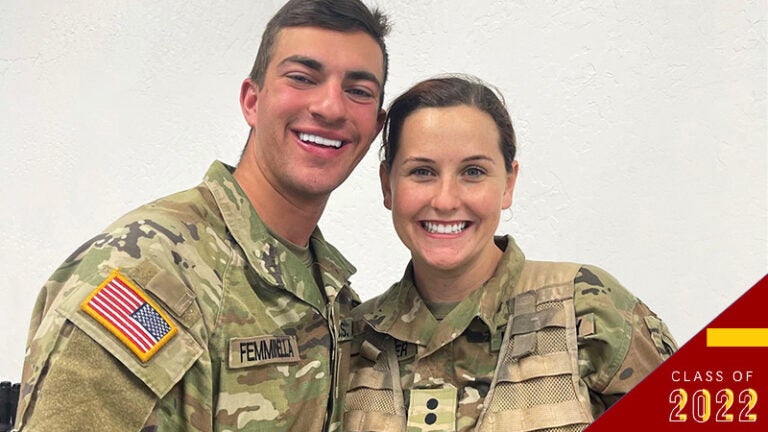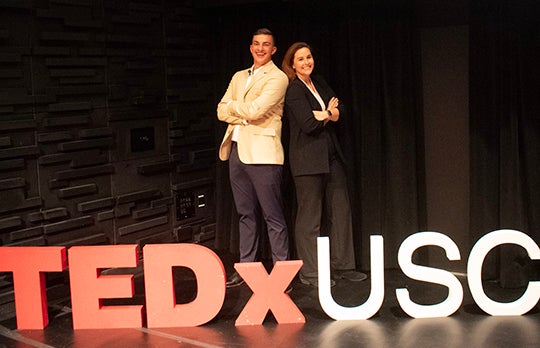
They met their first day on campus. Now they’re Army officers and run a near million-dollar start-up.
When Lucy Schafer was in 6th grade, her mother experienced a traumatic brain injury while deployed as a United States Army nurse in Iraq. The incident and its aftermath challenged the whole family as they struggled with the uphill battle of treatment and therapy.
The harrowing experience set Schafer on a path towards her undergraduate degree in computational neuroscience, which she’ll receive from the USC Dornsife College of Letters, Arts and Sciences on May 13.
“I found myself asking a lot of questions, trying to grapple with this as an 11-year-old,” she says. “I began to understand that not all injuries are physical, and that some of the worse ones are the ones that you can’t see.”
Her first day on campus as a student at USC, she met a kindred spirit.
Like Schafer, Brian Femminella had joined the Army at a young age, enjoyed science and technology, and had also witnessed the effect of warfare on veterans’ mental health.
When Femminella, a political science major at USC Dornsife and a computer and digital forensics minor at USC Viterbi School of Engineering, wanted to build a music therapy app, he knew Schafer was the perfect person to contribute to the neuroscience research.
The venture, dubbed SoundMind, launched in 2021 and has since acquired thousands of downloads, $900,000 in funding and office space at Tik Tok’s former headquarters in Culver City, California.
“A big reason why we’ve thrived together is that our passions are in the same place,” says Schafer.
Officers in training
When Schafer was growing up, the Army was the “family business.” Both of her parents retired from the service, and four of her siblings are Army veterans.
“I’m a big fan of service, and this is one of the best ways to do that,” says Schafer, who joined the Army right out of high school.
Femminella started volunteering with a fire department near his Long Island home when he was 13, and he convinced his mother to sign paperwork allowing him to join the Army on his 17th birthday. “She was pretty scared and nervous,” he admits.
He headed to Fort Jackson for training first, then to Fort Knox, where he was an operations intern to the Commanding General.
“My biggest motivation is social impact. Money is great, but when you see what you can do when you help people, that really matters more,” he says.
Both Femminella and Schafer arrived at USC thanks to the Army Reserve Officer Training Corps (ROTC) program, which enables students to attend college while also training to become military officers.
They’ll finish the journey they started together at their officer promotion ceremony on May 14, after which Schafer will enter the Army’s Medical Service Corps and Femminella will join the Army’s Military Intelligence Corps.
Schafer’s mother, now fully recovered from her injury, will be in attendance alongside Femminella’s mother, who has since warmed up to her son’s decision: “She’s very proud now,” he says.
Sound ideas

Brian Femminella and Lucy Schafer discussed the intersection of mental health care, technology and social impact at the March 25 TEDxUSC event.
Femminella’s involvement in the Army first got him thinking about how to help those struggling with trauma and brain injuries. “I had a good friend lose his memory from an incident during overseas training. I knew a lot of people with PTSD. That was a huge influence for my research,” he says.
He became interested in the healing power of music during freshman year after taking a course on world music with Scott Spencer, assistant professor of musicology at the USC Thornton School of Music. For a class project, Femminella researched the history of music therapy.
After the class ended, Femminella and Scott began examining music’s ability to alleviate the symptoms of PTSD. They conducted three studies involving veterans, which helped demonstrate the effectiveness of the therapy. Schafer assisted with this research, bringing in her computational neuroscience expertise. Next, they worked with the USC Institute for Creative Technologies to study how sound and music could be coupled with virtual reality for more effective therapy.
The idea for SoundMind, an app that could offer customizable music and visual therapy experiences, was sparked. Nothing like it existed on the market then, says Femminella.
A third Trojan, Travis Chen, who graduated for USC Dornsife in 2021 with a degree in international relations and global business, co-founded the venture with Femminella in early 2020. Chen and Femminella met while participating in USC Dornsife’s Washington, D.C. Program, which pairs USC students with policymakers for internships.
In November 2021, SoundMind was ready for launch. An event at the Grammy Museum and a billboard in New York City’s Times Square marked its introduction to the world, but a humbler encounter made a bigger impression on Femminella.
“We were at an Apple store the week after we launched, and the store worker noticed ‘SoundMind’ in our email. He said he’d been using the app every single day since it came out,” says Femminella.
All in the family
With their initial round of funding and office space secured, the SoundMind team has big ambitions. Both Femminella and Schafer will be working at the company full time after graduation. The next iteration of the app will launch this summer, with new music performed by former American Idol contestants.
They’re also working on getting clinically validated, which means completing scientific studies to prove the app’s effectiveness. Clinical trials have been approved, with results expected in a few years, Schafer says.
Femminella cites USC and the Trojan family as a key part of their success. Along with the three Trojan founders, the app has alumni investors and alumni on their advisory board.
“We give all the credit to USC for making these connections happen,” says Femminella. “The Trojan family has been nothing short of family-orientated. They say it’s a family, and they really mean it.”